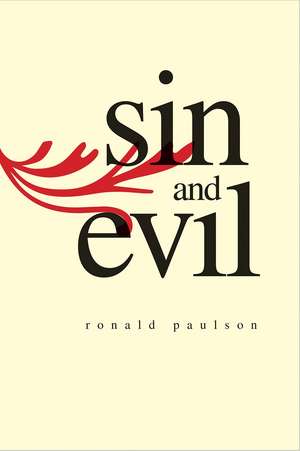Sin and Evil: Moral Values in Literature
Autor Ronald Paulsonen Limba Engleză Hardback – 28 mar 2007
A needed and timely book on sin and evil, and how they have been discussed and represented in Western literature from antiquity to the present day
The confusion of sin and evil, or religious and moral transgression, is the subject of Ronald Paulson’s latest book. He calls attention to the important distinction between sin and Evil (with a capital E) that in our times is largely ignored, and to the further confusion caused by the term “moral values.” Ranging widely through the history of Western literature, Paulson focuses particularly on American and English works of the eighteenth through twentieth centuries to discover how questions of evil and sin—and evil and sinful behavior—have been discussed and represented. The breadth of Paulson’s discussion is enormous, taking the reader from Greek and Roman tragedy, to Christian satire in the work of Swift and Hogarth, to Hawthorne’s and Melville’s novels, and finally to twentieth-century studies of good and evil by such authors as James, Conrad, Faulkner, Greene, Heller, Vonnegut, and O’Brien. Where does evil come from? What are “moral values”? If evil is a cultural construct, what does that imply? Paulson’s literary tour of sin and evil over the past two hundred years provides not only a historical perspective but also new ways of thinking about important issues that characterize our own era of violence, intolerance, and war.
The confusion of sin and evil, or religious and moral transgression, is the subject of Ronald Paulson’s latest book. He calls attention to the important distinction between sin and Evil (with a capital E) that in our times is largely ignored, and to the further confusion caused by the term “moral values.” Ranging widely through the history of Western literature, Paulson focuses particularly on American and English works of the eighteenth through twentieth centuries to discover how questions of evil and sin—and evil and sinful behavior—have been discussed and represented. The breadth of Paulson’s discussion is enormous, taking the reader from Greek and Roman tragedy, to Christian satire in the work of Swift and Hogarth, to Hawthorne’s and Melville’s novels, and finally to twentieth-century studies of good and evil by such authors as James, Conrad, Faulkner, Greene, Heller, Vonnegut, and O’Brien. Where does evil come from? What are “moral values”? If evil is a cultural construct, what does that imply? Paulson’s literary tour of sin and evil over the past two hundred years provides not only a historical perspective but also new ways of thinking about important issues that characterize our own era of violence, intolerance, and war.
Preț: 570.78 lei
Preț vechi: 741.28 lei
-23% Nou
Puncte Express: 856
Preț estimativ în valută:
109.23€ • 112.84$ • 90.91£
109.23€ • 112.84$ • 90.91£
Carte tipărită la comandă
Livrare economică 26 martie-09 aprilie
Preluare comenzi: 021 569.72.76
Specificații
ISBN-13: 9780300120141
ISBN-10: 0300120141
Pagini: 432
Ilustrații: 17 b-w scattered
Dimensiuni: 156 x 235 x 32 mm
Greutate: 0.83 kg
Editura: Yale University Press
Colecția Yale University Press
ISBN-10: 0300120141
Pagini: 432
Ilustrații: 17 b-w scattered
Dimensiuni: 156 x 235 x 32 mm
Greutate: 0.83 kg
Editura: Yale University Press
Colecția Yale University Press
Notă biografică
Ronald Paulson is Emeritus Professor of English, The Johns Hopkins University, and author of more than twenty previous books, including Hogarth: His Life, Art, and Times, published by Yale University Press.
Recenzii
“There is, to my knowledge, nothing to compare with this book’s ambitious scope. It’s a long journey, pleasantly conducted.” —Valentine Cunningham, Corpus Christi College in Oxford
"Professor Paulson's book is timely. No theme is more urgent or opportune. There are other studies of evil, but Paulson's is the most literary and the most wide-ranging."—Denis Donoghue, author of The American Classics and Speaking of Beauty
"This informative journey through centuries of literature, mostly British and American fiction, is the harvest of a distinguished career and brings together themes from the author's many previous publications. . . . [An] erudite and impressive study."—Robert F. Brown, The Review of Metaphysics
